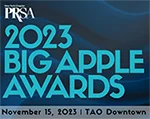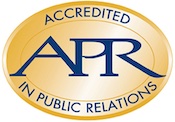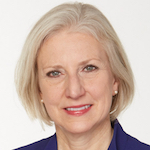 The PRSA Assembly Oct. 11 voted 185 to 57 to allow non-accredited members to run for the board for the first time since the 1970s. Mark McClennan bested Blake Lewis for chair-elect by a 156-110 margin.
The PRSA Assembly Oct. 11 voted 185 to 57 to allow non-accredited members to run for the board for the first time since the 1970s. Mark McClennan bested Blake Lewis for chair-elect by a 156-110 margin.Members noted that since only two of the 17 board seats would be open each year to non-APRs, there is no chance non-APRs could be anything but a minor factor on the board.
An additional burden for the non-APR candidates is that they have to have either 20 years’ experience in PR or a record of national, chapter or section leadership.
Chair Joe Cohen, chair-elect Kathy Barbour, and immediate past chair Mickey Nall repeatedly vowed that the Society would continue promote APR as a highly desirable credential.
Cohen said that a new CEO is "under contract" but the identity of the person cannot be revealed until his or her current employer is informed. The search committee had said that a Certified Assn. Executive was being sought. It was also revealed that Atlanta will be the site of the 2015 conference. IRS Form 990, containing the pay packages of the top six staffers, was withheld from the Assembly and press. Final deadline for filing is Nov. 15.
Cohen said numerous times that the Society would find new ways to improve and market APR although only 18% of members are APR and the percentages has been declining for many years. There will be no retreat from the 50-year-old program, he said.
Barbour told the delegates, "I wear my APR pin proudly." She said her year in office will be devoted to promoting APR and also expressed "commitment to ethics and diversity." She promised "a more visual and dynamic and a more user-friendly Society website."
A delegate noted that a $50,000+ study last year by consultant Laura Freebairn-Smith, who interviewed 750 members for the 50th anniversary of APR in 2014, advised the Society that APR was not a legitimate credential because it is self-administered.
|
McClennan |
The UAB has said that attempts are being made to win recognition by a third party but it is handicapped in it efforts by lack of staff and funds. Bey-Ling Sha of San Diego State University is UAB chair. Kathy Mulvihill is a full time Society staffer on APR.
Some members feel the only purpose that APR serves is keeping a small clique of members in control of the Society.
Leaders Control Mike in A.M.
Presentations and remarks by leaders, consultants and staffers dominated the a.m. part of the Assembly. Delegates only got 20 minutes of the nearly three-hour session for their own comments. The session ran from 8:45 to noon and included a half-hour mid-morning break.
It was 11:30 a.m. by the time that delegates were allowed to speak for and against the APR proposal. They defeated a motion to extend debate for ten more minutes by a 138-91 margin.
Besides Cohen, there were presentations by treasurer McClennan; a speech by Nall; a speech by Barbour, and a half-hour presentation by David Rockland, Ph.D., partner and managing director of Ketchum, based on a survey of members.
The survey found that the “Millennials” (born after 1976) see APR as an important sign of personal commitment to PR but do not see it as an indication of leadership abilities.
The Ketchum executive said the Society’s membership is aging and faces serious problems by 2020 unless it does something. A slide showed the sun shining on the Society in 2014 but dark clouds forming in 2020.
Rockland, who has a Ph.D. in economics, is the primary author of the Barcelona Principles, a set of standards for PR measurement. Since 2008 he has been CEO of Ketchum’s management consulting and internal communications company, Ketchum Change. In 2007 he began development of Ketchum Digital, the agency’s global interactive offerings.
He is chair of the International Assn. for Measurement and Evaluation of Communications (AMEC) and has chaired the IPR Commission on PR Measurement and Evaluation
McClennan, Lewis Pitch for Chair-Elect
McClennan and Lewis each gave 20 minute presentations in their quest to be chair-elect in 2015. Both stressed their decades of participation in the Society and emphasized their ability to be “collaborative.”
Each also expressed commitment to the APR program. Questions had been sent to the two candidates by this website asking them to address such issues as the Society's habit of booking dues as cash instead of booking them over the 12-month period of the membership, and bypassing New York as a conference site (last conference there was in 2004 and it is not on the current conference schedule). Such issues were not discussed by McClennan or Lewis at the Assembly. Neither replied to our emails.
The Assembly was not recorded although that was standard practice for many years. Up until 2005, an audiotape of the Assembly and transcript were available.
Other groups now live webcast their annual meetings including the National Press Club, which did that for its meeting Oct. 10, and the Canadian PR Society.



 PRSA-NY today announced its five honorary co-chairs for its Big Apple Awards ceremony gala slated for TAO Downtown on Nov. 15.
PRSA-NY today announced its five honorary co-chairs for its Big Apple Awards ceremony gala slated for TAO Downtown on Nov. 15. PRSA-NY president Carmella Glover today issued a "heartfelt apology" on behalf of the chapter for her Oct. 14 message that "caused disappointment and hurt to some of our valued members."
PRSA-NY president Carmella Glover today issued a "heartfelt apology" on behalf of the chapter for her Oct. 14 message that "caused disappointment and hurt to some of our valued members." The leadership of Public Relations Society of America is backing a move to change the current “must-have” APR accreditation to “strongly preferred” as a requirement for a seat on its board of directors.
The leadership of Public Relations Society of America is backing a move to change the current “must-have” APR accreditation to “strongly preferred” as a requirement for a seat on its board of directors. Public Relations Society of American today named Linda Thomas Brooks CEO, succeeding CFO Phil Bonaventura, interim chief since July 2019.
Public Relations Society of American today named Linda Thomas Brooks CEO, succeeding CFO Phil Bonaventura, interim chief since July 2019.


 Have a comment? Send it to
Have a comment? Send it to 
No comments have been submitted for this story yet.